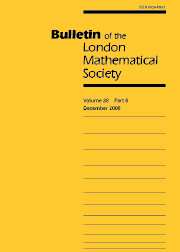No CrossRef data available.
Article contents
BINOMIAL SUMS AND FUNCTIONS OF EXPONENTIAL TYPE
Published online by Cambridge University Press: 08 February 2005
Abstract
Let $(a_n)_{n\ge 0}$ be a sequence of complex numbers, and, for $n\,{\ge}\,0$, let \[ b_n=\sum_{k=0}^n{n\choose k}a_k\quad\hbox{and}\quad c_n=\sum_{k=0}^n{n\choose k}(-1)^{n-k}a_k. \] A number of results are proved relating the growth of the sequences $(b_n)$ and $(c_n)$ to that of $(a_n)$. For example, given $p\,{\ge}\,0$, if $b_n\,{=}\,O(n^p)$ and $c_n\,{=}\,O(e^{\epsilon\sqrt{n}})$ for all $\epsilon\gt0$, then $a_n\,{=}\,0$ for all $n\gt p$. Also, given $0\lt\rho\lt1$, then $b_n,c_n\,{=}\,O(e^{\epsilon n^\rho})$ for all $\epsilon\gt0$ if and only if $n^{1/\rho-1}|a_n|^{1/n}\to 0$. It is further shown that, given $\beta\gt1$, if $b_n,c_n\,{=}\,O(\beta^n)$, then $a_n\,{=}\,O(\alpha^n)$, where $\alpha\,{=}\,\sqrt{\beta^2-1}$, thereby proving a conjecture of Chalendar, Kellay and Ransford. The principal ingredients of the proofs are a Phragmén–Lindelöf theorem for entire functions of exponential type zero, and an estimate for the expected value of $e^{\phi(X)}$, where $X$ is a Poisson random variable.
- Type
- Papers
- Information
- Copyright
- © The London Mathematical Society 2005




